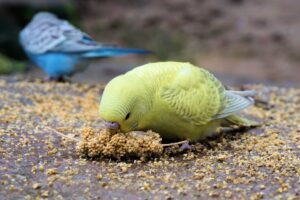60+ Cheapest Parrot Cage | Buy Wooden, Metal, Bamboo and Aryclic Parrot Cages
A parrot cage is an essential accessory for everyone who has a pet parrot. It not only provides a safe and secure home for the Parrot, but it also ensures that it remains healthy and happy. In this article, we will cover all you need to know about parrot cages, including their many types, materials, and how to pick the best one for your feathered friend. We provide you a list of the best Parrot cages, which you can buy from the given links below.
Types of Parrot Cages:
There are different types of parrot cages available in the market and in online stores, choosing the right one depends on your parrot’s size and behaviour. Some of the common types of parrot cages are:
1. Flight Cages:
These are large cages that are suitable for larger parrots who like flying. Flight cages are large enough for the bird to expand its wings and move around. They are often composed of metal and include multiple perches and feeding stations.
Best Flight Cages Available Online:
2. Dome Cages:
These cages have a dome-shaped top, which gives your parrot more headroom to move around. They are a great option for medium-sized parrots and come in various sizes and styles.
Best Dome Cages Available Online:
3. Playtop Cages:
Playtop cages have a detachable playpen on top of the cage, providing more area for your bird to play and exercise. They are a popular alternative for parrot owners who want to interact with and entertain their parrots.
Best Playtop Cages Available Online:
4. Travel Cages:
These cages are designed for easy transportation, making them perfect for trips to the vet or travelling. They are usually smaller in size, lightweight, and made of durable materials.
Best Travel Cages Available Online:
Different Materials Used in Parrot Cages:
The materials used to make parrot cages are important, as they determine the durability and safety of the cage. Here are some common materials used to make parrot cages:
1. Metal Cages for Parrot:
Metal is the most commonly used material for parrot cages. It is strong, long-lasting, and easy to clean. Also, some metals, such as zinc and lead, can be toxic to birds. As a result, it is important to choose a cage made of bird-safe metals such as stainless steel or powder-coated steel.
Best Metal Parrot Cages Available online:
2. Wood Parrot Cages:
Wooden cages are a natural and eco-friendly option for parrot your parrot. Although, they are not as durable as metal cages and are difficult to clean. Also, parrots may chew on the wood, which can be harmful to their health.
Best Wood Parrot Cages Available online:
3. Acrylic Parrot Cages:
Acrylic cages are a modern and stylish option for your parrot. They are lightweight, easy to clean and provide excellent visibility of the bird. Although, they are not as durable as metal cages and can easily scratch.
Best Acrylic Parrot Cages Available online:
4. Bamboo Parrot Cages:
Bamboo is another eco-friendly option for parrot cages. It is durable, lightweight, and easy to clean. But, it can be expensive, and there are concerns about its sustainability.
Best Bamboo Parrot Cages Available online:
Choosing the Right Parrot Cage:
Choosing the right parrot cage is important for your parrot’s health and happiness. Here are some factors to consider when selecting a parrot cage:
- Size: The cage should be spacious enough for your parrot to move around comfortably. In simple words, the cage should be at least two times the wingspan of the bird.
- Bar Spacing: The bar spacing should be narrow enough to prevent the parrot from escaping but wide enough to allow for proper ventilation.
- Durability: The cage should be made of durable materials that can withstand the bird’s chewing and play.
- Accessibility: The cage should have multiple doors for easy access and cleaning.
- Perches and Accessories: The cage should have multiple perches and feeding stations to provide the parrot with different activities and stimulation.
Video Credit- Parrot Cage – REUNITED PET WORLD
Caring for Your Parrot Cage:
Caring for your parrot cage is important to ensure your bird stays healthy and happy. Here are some tips for maintaining your parrot cage:
Clean the cage regularly:
Regular cleaning is essential to prevent the accumulation of germs and bacteria. Before cleaning the cage with mild soap and warm water, remove the parrot’s food and water bowls, perches and toys. Rinse thoroughly and allow the drill to dry completely before changing accessories.
Replace accessories:
Replace the perches, toys, and feeding stations regularly to provide your parrot with different activities and stimulation.
Check for damage:
Inspect the cage regularly for any signs of damage or wear and tear. Repair or replace any damaged parts to ensure the parrot’s safety.
Location:
Place the cage in a well-ventilated area away from direct sunlight, drafts, and other pets. Ensure that the cage is at a comfortable temperature for the Parrot.
Provide a variety of foods:
Offer a variety of fresh fruits, vegetables, and grains in addition to the bird’s regular diet to provide essential nutrients and keep the Parrot entertained.
Conclusion:
A parrot cage is an essential piece of equipment for every parrot owner. This creates a safe environment for the bird and ensures that it remains healthy and happy. When choosing a parrot cage, consider cage size, materials, and durability. Regular cleaning and maintenance of the cage is essential for the safety and well-being of the bird. By following these tips, you can provide your feathered friend with a comfortable and happy home.
FAQ:
-
What size cage should I get for my parrot?
The cage size depends on the size of your parrot. As a general rule, the cage should be at least two times the wingspan of the bird.
-
What type of material is safe for parrot cages?
Parrot cages should be made of bird-safe materials, such as stainless steel or powder-coated steel. Avoid cages made of zinc or lead, which can be toxic to birds.
-
How often should I clean my parrot’s cage?
You should clean your parrot’s cage at least once a week. Remove the bird’s food and water bowls, perches, and toys before cleaning the cage with mild soap and warm water. Rinse thoroughly and allow the cage to dry completely before replacing the accessories.
-
Can parrots chew through their cage bars?
Yes, parrots can chew through some types of cage bars, especially those made of wood or plastic. It’s important to choose a cage made of durable materials that can withstand the bird’s chewing and play.
-
Should I cover my parrot’s cage at night?
It’s not necessary to cover your parrot’s cage at night, but it can help the bird sleep better. Cover the cage with a breathable cloth or sheet, and ensure that the bird has access to food and water.
-
How often should I replace my parrot’s toys?
You should replace your parrot’s toys regularly to provide different activities and stimulation. Replace the toys every few weeks or as soon as they become damaged or worn out.
-
Can I keep multiple parrots in the same cage?
Keeping several parrots in the same cage is feasible, but it’s crucial to make sure the cage is big enough for all the birds to roam about comfortably. To guarantee that the birds get along and don’t quarrel, attentively observe their behaviour.
Recommended:
Ringneck Parrot Price In India (Mar 2023) | Food, Care Tips, Lifespan, Training
99+ Best Horse Toys for Children: Choosing Safe and Fun Options





























